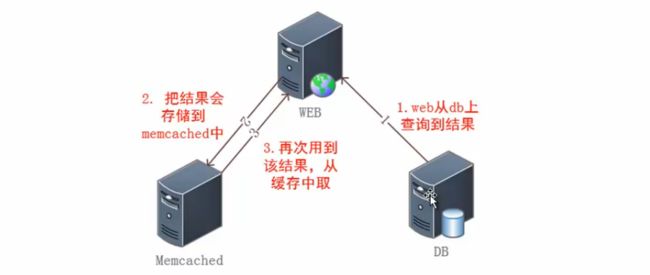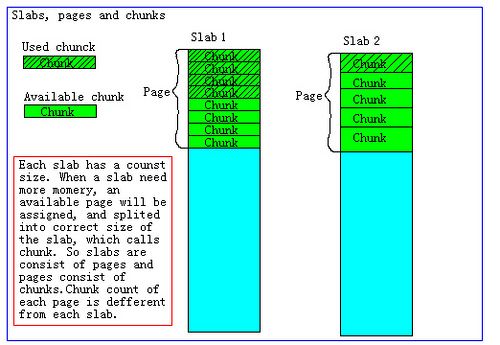一、Memcached介绍
是国外社区网站LiveJournal团队开发,通过缓存数据库查询结果,减少数据库访问次数,从而提高动态web站点性能。官方站点 http://memcached.org/
memcached属于键值(Key-Value)存储数据库,适合储存用户信息,比如会话、配置文件、参数、购物车等等。这些信息一般都是和ID(键)挂钩,这种情景下键值数据库是个很好的选择。
1、Memcached特性
(1)基于c/s架构,协议简单
(2)基于libevent的事件处理
(3)自主内存存储处理(slab allowcation)
(4)数据过期方式:Lazy Expiration和LRU
2、memcached数据流
3、Slab Allowcationde
Slab Allowcationde原理:将分配的内存分割成各种尺寸的块(chunk),并把尺寸相同的块分成组(chunk的集合),每个chunk集合被称为slab。
Memcached的内存分配以Page为单位,Page默认值为1M,可以在启动时通过-l参数来指定。
Slab是由多个Page组成的,Page按照指定大小切割成多个chunk。其结构如图:
4、Growth Factor
memcached在启动时通过 -f 选项可以指定 Growth Factor 因子。该值控制slab之间的差异,chunk大小的差异。默认值为1.25。通过memcached-tool查看指定memcached实例的不同slab状态,可以看到各Item所占大小(chunk大小)差距为1.25
命令:#memcached-tool 127.0.0.1:11211 display
5、Memcached数据过期方式
(1)Lazy Expiration:
memcached内部不会监视记录是否过期,而是在get时查看记录的时间戳,检查记录是否过期。这种技术被称为lazy(惰性)expiration。因此,memcached不会再过期监视上耗费CPU时间。
(2)LRU:
memcached会优先使用已超时的记录的空间,但即使如此,也会发生追加新纪录时空间不足的情况,此时就要使用名为Least Recently Used(LRU)机制来分配空间。顾名思义,这是删除“最近最少使用”的记录的机制。因此,当内存空间不足时(无法从slab class获取到新的空间时),就从最近未被使用的记录中搜索,并将其空间分配给新的记录。从缓存的实用角度来看,该模型十分理想。
二、Memcached安装
[root@centos ~]# yum install -y epel-release
[root@centos ~]# yum install -y libevent memcached libmemcached
[root@centos ~]# /etc/init.d/memcached start
[root@centos ~]# netstat -lnp |grep memcached //可查看memcached端口号为11211
tcp 0 0 0.0.0.0:11211 0.0.0.0:* LISTEN 1931/memcached tcp 0 0 :::11211 :::* LISTEN 1931/memcached udp 0 0 0.0.0.0:11211 0.0.0.0:* 1931/memcached udp 0 0 :::11211 :::* 1931/memcached |
[root@centos ~]# ps aux |grep memcached //查看进程
498 1931 0.1 0.0 58188 896 ? Ssl 03:51 0:00 memcached -d -p 11211 -u memcached -m 64 -c 1024 -P /var/run/memcached/memcached.pid root 1939 0.0 0.0 5980 748 pts/0 S+ 03:52 0:00 grep memcached |
1、Memcached启动参数说明
-d 是启动一个守护进程。 -p 是设置Memcached监听的端口,默认是11211。 -u 是运行Memcached的用户,如果当前为root的话,需要使用此参数指定用户。 -m 是分配给Memcached使用的内存数量,单位是MB,这里是64MB。 -l 是监听的服务器IP地址,默认没有。 -c 是最大运行的并发连接数,默认是1024。 -P 是设置保存Memcached的pid文件。 启动的相关参数在 /etc/init.d/memcached 和 /etc/sysconfig/memcached 中定义,若要修改启动参数,只有修改 /etc/sysconfig/memcached 才有效,修改 /etc/init.d/memcached 不会生效。 |
2、查看Memcached运行状态
[root@centos ~]# memcached-tool 127.0.0.1:11211 stats
#127.0.0.1:11211 Field Value accepting_conns 1 auth_cmds 0 auth_errors 0 bytes 0 bytes_read 7 bytes_written 0 cas_badval 0 cas_hits 0 cas_misses 0 cmd_flush 0 cmd_get 0 cmd_set 0 conn_yields 0 connection_structures 11 curr_connections 10 curr_items 0 decr_hits 0 decr_misses 0 delete_hits 0 delete_misses 0 evictions 0 get_hits 0 //命中数量 get_misses 0 incr_hits 0 incr_misses 0 limit_maxbytes 67108864 listen_disabled_num 0 pid 1931 pointer_size 32 rusage_system 0.119981 rusage_user 0.031995 threads 4 time 1448396035 total_connections 11 total_items 0 uptime 1332 version 1.4.4 |
注意:命中率为 get_hits/cmd_get 大于80%才行。
3、查看Memcached服务状态
[root@centos ~]# memstat --servers=127.0.0.1:11211 //需安装libmemcached
Listing 1 Server Server: 127.0.0.1 (11211) pid: 1931 uptime: 1379 time: 1448396082 version: 1.4.4 pointer_size: 32 rusage_user: 0.32994 rusage_system: 0.122981 curr_items: 0 total_items: 0 bytes: 0 curr_connections: 10 total_connections: 12 connection_structures: 11 cmd_get: 0 cmd_set: 0 get_hits: 0 get_misses: 0 evictions: 0 bytes_read: 0 bytes_written: 0 limit_maxbytes: 67108864 threads: 4 |
三、Memcached基本操作
1、memcached命令
[root@centos ~]# yum install -y telnet* //先安装telnet
[root@centos ~]# vim /etc/xinetd.d/telnet
| disable = no |
[root@centos ~]# service xinetd start //开启telnet服务和xinetd
[root@centos ~]# telnet 127.0.0.1 11211 //连接memcached
Trying 127.0.0.1... Connected to 127.0.0.1. Escape character is '^]'. set key1 0 300 2 //储存数据 ab STORED get key1 VALUE key1 0 2 ab END replace key1 111 400 3 //替换数据 abc STORED get key1 VALUE key1 111 3 abc END delete key1 //删除数据 DELETED get key1 END quit //退出连接 |
2、memcached语法规则
1) "set"表示按照相应的 "add"表示按照相应的 "replace"表示按照相应的 "delete"表示删除相应的 2) 3) 4) 若为0,表示存储的数据永远不过期(但可被服务器算法LRU等替换) 若为非0,当过期后,服务器可以保证用户得不到该数据(以服务器时间为标准) 5) 6)\r\n 在Windows下是Enter键。 7)需要存储的内容,输入完成后,最后客户端需要加上"\r\n"(直接Enter)作为“命令头”的结束标志。 |
四、PHP 连接 Memcached
1、安装php的memcache扩展
[root@centos ~]# cd /usr/local/src/
[root@centos src]# wget http://www.lishiming.net/data/p_w_upload/forum/memcache-2.2.3.tgz
[root@centos src]# tar -zvxf memcache-2.2.3.tgz
[root@centos memcache-2.2.3]# /usr/local/php/bin/phpize
[root@centos memcache-2.2.3]# ./configure --with-php-config=/usr/local/php/bin/php-config
[root@centos memcache-2.2.3]# make
[root@centos memcache-2.2.3]# make install
| Installing shared extensions: /usr/local/php/lib/php/extensions/no-debug-non-zts-20131226/ |
2、配置
[root@centos memcache-2.2.3]# ls /usr/local/php/lib/php/extensions/no-debug-non-zts-20131226/
| memcache.so opcache.so |
[root@centos memcache-2.2.3]# vim /usr/local/php/etc/php.ini
extension_dir = "/usr/local/php/ext" //指定目录,默认是在no-debug-non-zts-20131226 extension = memcache.so //末尾添加一行 |
[root@centos memcache-2.2.3]# mkdir /usr/local/php/ext
[root@centos memcache-2.2.3]# cp /usr/local/php/lib/php/extensions/no-debug-non-zts-20131226/memcache.so /usr/local/php/ext
[root@centos memcache-2.2.3]# ls /usr/local/php/ext
| memcache.so |
3、检测是否连接成功
[root@centos memcache-2.2.3]# /usr/local/php/bin/php -m |grep memcache //有memcache模块
| memcache |
[root@centos memcache-2.2.3]# vim 1.php //编辑测试的php脚本
//连接Memcache Memcache $mem = new Memcache; $mem->connect("localhost", 11211); //保存数据 $mem->set('key1', 'This is first value', 0, 60); $val = $mem->get('key1'); echo "Get key1 value: " . $val ." //替换数据 $mem->replace('key1', 'This is replace value', 0, 60); $val = $mem->get('key1'); echo "Get key1 value: " . $val . " //保存数组数据 $arr = array('aaa', 'bbb', 'ccc', 'ddd'); $mem->set('key2', $arr, 0, 60); $val2 = $mem->get('key2'); echo "Get key2 value: "; print_r($val2); echo " //删除数据 $mem->delete('key1'); $val = $mem->get('key1'); echo "Get key1 value: " . $val . " //清除所有数据 $mem->flush(); $val2 = $mem->get('key2'); echo "Get key2 value: "; print_r($val2); echo " //关闭连接 $mem->close(); ?> |
[root@centos memcache-2.2.3]# /usr/local/php/bin/php 1.php //运行测试脚本
Get key1 value: This is first value ( [0] => aaa [1] => bbb [2] => ccc [3] => ddd )
|
显示上面的内容,说明解析成功。
五、Memcached 共享 Session
本实例是在lamp/lnmp环境中实现,通用方法。
1、编辑php.ini
[root@centos memcache-2.2.3]# vim /usr/local/php/etc/php.ini
找到: session.save_handler = files //注释掉 添加两行: session.save_handler = "memcache" session.save_path = "tcp://127.0.0.1:11211" //若是远程memcached,则为远程机器ip |
2、测试
1)在lamp下测试:
[root@centos memcache-2.2.3]# cd /usr/local/apache2/htdocs
[root@centos htdocs]# vim session.php
session_start(); if (!isset($_SESSION['TEST'])) { $_SESSION['TEST'] = time(); } $_SESSION['TEST3'] = time(); print $_SESSION['TEST']; print " print $_SESSION['TEST3']; print " print session_id(); ?> |
[root@centos htdocs]# /usr/local/apache2/bin/apachectl start //开启httpd服务
[root@centos htdocs]# curl -x127.0.0.1:80 localhost/session.php //curl测试php脚本
| 1448477726 1448477726 h581d37pj6jbl9md4r67tim317 |
[root@centos htdocs]# telnet 127.0.0.1 11211
Trying 127.0.0.1... Connected to 127.0.0.1. Escape character is '^]'. get h581d37pj6jbl9md4r67tim317 //get key VALUE h581d37pj6jbl9md4r67tim317 0 37 TEST|i:1448477726;TEST3|i:1448477726; END |
由测试结果可知,memcached数据库获取了key内容,在lamp环境下,memcached实现了session共享。
2)在lnmp下测试:
[root@centos htdocs]# cp session.php /usr/local/nginx/html/ //复制脚本到nginx环境下
[root@centos html]# /usr/local/apache2/bin/apachectl stop //关闭httpd服务
[root@centos html]# service nginx start //开启nginx服务
[root@centos html]# curl -x127.0.0.1:80 localhost/session.php
| 1448479908 1448479908 pmvlj2af2iq5to6hn1viuuo0n0 |
[root@centos html]# telnet 127.0.0.1 11211
Trying 127.0.0.1... Connected to 127.0.0.1. Escape character is '^]'. get pmvlj2af2iq5to6hn1viuuo0n0 VALUE pmvlj2af2iq5to6hn1viuuo0n0 0 37 TEST|i:1448479908;TEST3|i:1448479908; END |
由上面测试结果可知,在lnmp环境下,memcached也实现了session共享。
注意说明:
上面实例是在lamp/lnmp环境中通用的方法,另外一种方法是单独在lamp或者lnmp下实现,不用修改php.ini文件,直接修改下面对应的配置文件: 1)lamp 在 httpd.conf 对应的虚拟主机中添加(可以针对每个虚拟主机进行memcached共享session) session.save_handler = "memcache" session.save_path = "tcp://127.0.0.1:11211" 2)lnmp 在 php-fpm.conf 对应的pool中添加 session.save_handler = "memcache" session.save_path = "tcp://127.0.0.1:11211" |

